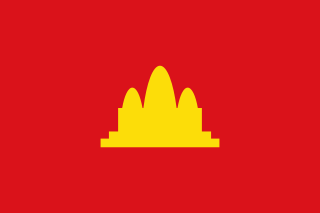
The Khmer Rouge is the name that was popularly given to members of the Communist Party of Kampuchea (CPK) and by extension to the regime through which the CPK ruled Cambodia between 1975 and 1979. The name was coined in the 1960s by then Chief of State Norodom Sihanouk to describe his country's heterogeneous, communist-led dissidents, with whom he allied after his 1970 overthrow.

Ros Serey Sothea was a Cambodian singer. She was active during the final years of the First Kingdom of Cambodia and into the Khmer Republic period. She sang in a variety of genres; romantic ballads emerged as her most popular works. Despite a relatively brief career she is credited with singing hundreds of songs. She also ventured into acting, starring in a few films. Details of her life are relatively scarce. She disappeared during the Khmer Rouge regime of the late 1970s but the circumstances of her fate remain a mystery. Norodom Sihanouk granted Sothea the honorary title "Queen with the Golden Voice."

First They Killed My Father: A Daughter of Cambodia Remembers is a 2000 non-fiction book written by Loung Ung, a Cambodian-American author and childhood survivor of Democratic Kampuchea. It is her personal account of her experiences during the Khmer Rouge regime.
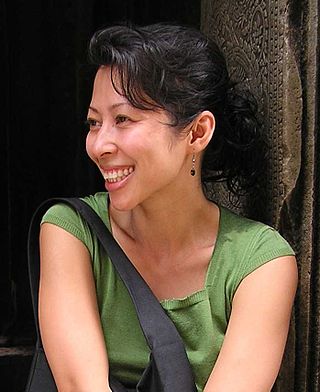
Loung Ung is a Cambodian-American human-rights activist, lecturer and national spokesperson for the Campaign for a Landmine-Free World from 1997 to 2003. She has served in the same capacity for the International Campaign to Ban Landmines, which is affiliated with the Vietnam Veterans of America Foundation.

Ieng Thirith was an influential intellectual and politician in the Khmer Rouge, although she was neither a member of the Khmer Rouge Standing Committee nor of the Central Committee. Ieng Thirith was the wife of Ieng Sary, who was Minister of Foreign Affairs of Democratic Kampuchea's Khmer Rouge regime. She served as Minister of Social Affairs from October 1975 until the fall of the Khmer Rouge in 1979.

Elizabeth Becker is an American journalist and author. She has written five books and is best known for her reporting and writing on Cambodia.
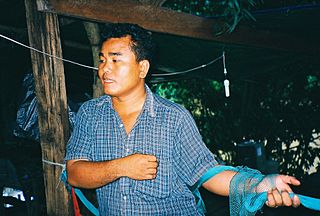
Aki Ra is a former Khmer Rouge conscripted child soldier who works as a deminer and museum curator in Siem Reap, Cambodia. He has devoted his life to removing landmines in Cambodia and to caring for young landmine victims. Aki Ra states that since 1992 he has personally removed and destroyed as many as 50,000 landmines, and is the founder of the Cambodian Landmine Museum.

Democratic Kampuchea was the Cambodian state from 1975 to 1979, under the totalitarian dictatorship of Pol Pot and the Communist Party of Kampuchea (CPK), commonly known as the Khmer Rouge. It was established following the Khmer Rouge's capture of the capital Phnom Penh, effectively ending the United States-backed Khmer Republic of Lon Nol. After Vietnam took Phnom Penh in 1979, it was disestablished in 1982 with the creation of the CGDK in its place.

Vann Nath was a Cambodian painter, artist, writer, and human rights activist. He was the eighth Cambodian to win the Lillian Hellman/Hammett Award since 1995. He was one of only seven known adult survivors of S-21 camp, where 20,000 Cambodians were tortured and executed during the Khmer Rouge regime.

Dy Saveth is a Cambodian actress and first Miss Cambodia (1959) often referred to as the "actress of tears". She is "one of the most beloved actresses from the 1960s era of Cambodian film".

Chum Mey is one of only seven known adult survivors of the Khmer Rouge imprisonment in the S-21 Tuol Sleng camp, where 20,000 prisoners, mostly Cambodians, were sent for execution. Formerly a motor mechanic working in Phnom Penh, he was taken to the prison on 28 October 1978, accused of being a spy. His life was only spared because of his ability to repair sewing machines for Pol Pot's soldiers. In 2004, he described the killing of his wife and son:
"First they shot my wife, who was marching in front with the other women," he said. "She screamed to me, 'Please run, they are killing me now'. I heard my son crying and then they fired again, killing him. When I sleep, I still see their faces, and every day I still think of them".
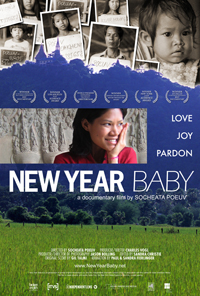
New Year Baby is a 2006 documentary film that tells the story of a family that survived the Cambodian genocide, and started a new life in the United States. The film was directed by Socheata Poeuv and produced by Charles Vogl. It won the 2007 IDFA "Movies That Matter" Award, an initiative of Amnesty International, as well as eight other international awards. It was aired on National PBS in 2008.

The Cambodian genocide was the systematic persecution and killing of Cambodian citizens by the Khmer Rouge under the leadership of Prime Minister of Democratic Kampuchea, Pol Pot. It resulted in the deaths of 1.5 to 2 million people from 1975 to 1979, nearly 25% of Cambodia's population in 1975.
Ros Saboeut was a Cambodian activist known for working on behalf of that country's musicians. Saboeut was one of five siblings born to her parents, Ros Bun and Nath Samean. Her younger sister was singer Ros Serey Sothea.
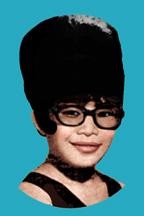
Mao Sareth was a Cambodian singer active from the early 1960s to the mid-1970s. Sareth was born in 1944 in Battambang, with the birth name Pol Sarann. She was one of the earliest popular singers in the Cambodian rock scene of the early 1960s, in which musicians combined traditional Khmer music styles with popular forms from the United States, Europe, and Latin America. Mao was cited as an influence by later singers Pen Ran and Ros Serey Sothea. She is known to have performed live as late as 1973.

First They Killed My Father is a 2017 Cambodian–American Khmer-language biographical historical thriller film directed by Angelina Jolie and written by Jolie and Loung Ung. The film is based on Ung's eponymous memoir. Set in 1975, the film depicts 5-year-old Loung, who is forced to train as a child soldier while her siblings are sent to labor camps during the Khmer Rouge regime.
Cambodian rock of the 1960s and 1970s was a thriving and prolific music scene based in Phnom Penh, Cambodia, in which musicians created a unique sound by combining traditional Cambodian music forms with rock and pop influences from records imported into the country from Latin America, Europe, and the United States. U.S. armed forces radio that had been broadcast to troops stationed nearby during the Vietnam War was also a primary influence. This music scene was abruptly crushed by the Khmer Rouge communists in 1975, and many of its musicians disappeared or were executed during the ensuing Cambodian genocide. Due to its unique sounds and the tragic fate of many of its performers, the Cambodian rock scene has attracted the interest of music historians and record collectors, and the genre gained new popularity upon the international release of numerous compilation albums starting in the late 1990s.

Funan is a 2018 period drama animated film directed by Denis Do and written by Do and Magali Pouzol with the participation of Elise Trinh, about a Cambodian woman's search for her child, who was forcibly taken from her, during the beginning of the Khmer Rouge revolution in April 1975.

The Dangrek genocide, also known as the Preah Vihear pushback, is a border incident which took place along the Dangrek Mountain Range on the Thai-Cambodian border which resulted in the death of many mostly Sino-Khmer refugees who were refused asylum by the Kingdom of Thailand in June 1979.
















